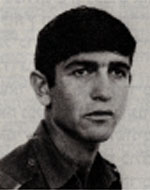Halabi, Mo’in
Mu’in, son of Zarqa Varshad, was born on 22 November 1951 in the village of Daliyat al-Carmel. He studied at the elementary school in Daliyat al-Carmel and then completed his studies at the Ironi Aleph High School in Haifa and successfully passed his matriculation exams. Mu’in was a loyal son of the Druze community, which linked its fate to the State of Israel. He sought to bring the hearts of the Jewish youth and the Druze youth closer and wanted to bring about the full integration of his village into the life of the state. As a high school student he was elected president of the Youth Parliament. He initiated many activities aimed at bringing Jewish youth closer to the Druze youth in Haifa. Mu’in was a good-hearted young man who shared everything he had with his friends. He was willing to help anyone, even if it was very difficult. He excelled in serious and mature judgment, he knew how to distinguish between the essential and the essential, and to choose the best and desirable way to go. Before deciding, he would thoroughly examine the data, devote considerable time to planning and thinking, and then decide the best decision under the circumstances. He set himself challenges and goals and always aspired to achieve them. When he encountered obstacles he would accept them with peace of mind and make great efforts to overcome and continue the path he had chosen for himself. Mu’in devoted most of his spare time to football. Together with his friends in the village, he established the “Hapoel” football team, Dalit Al-Carmel, and was the team’s manager and one of its most prominent players. He registered the team in the Football Association and later worked among the members of the local council and the workers’ council of the village in order to establish a football field for the team. He was also responsible for all organizational and administrative activities involved in setting up a football team. On the field he appeared as a noble figure, a fair athlete and a great player. He was the leader of the group and the living spirit in it. After graduating from high school, he studied at the University of Haifa in political science, languages and Hebrew literature. He was recruited to the IDF in mid-November 1972. He volunteered to serve in an elite patrol unit, composed mainly of members of the Druze community. He completed his basic training with honors and after a period of service was sent to a course for squad commanders in the Golani Brigade. He was an excellent soldier, and set himself a challenge to excel in his military service. Indeed, he fulfilled with precision and completeness all the tasks assigned to him and received great respect from his commanders. He was a devoted and loyal friend who encouraged his friends in the unit and sang a pleasant atmosphere even during the difficult hours of training and operational activity. When the Yom Kippur War broke out, Mu’in was in a course for squad commanders at the training base of the Golani Brigade. The company was on the verge of finishing the course and went on a week’s leave so that its soldiers could work and collect money for the graduation party of the long and arduous course. On the eve of Yom Kippur, they approached him from the unit and asked him to call his comrades back to the base. By the end of Yom Kippur, all the soldiers of the unit had been able to stand at their base. The class commanders fought with the soldiers of the Golani Brigade in the battle against the Syrians in the Golan Heights. During the attempt to capture the Hermon outpost on October 8, 1973, Mu’in was wounded and killed when he tried to rescue a wounded member who was exposed to enemy fire. He was brought to rest in the village of Daliyat al-Carmel. Survived by his parents, four brothers and three sisters. After his fall, he was promoted to corporal. The commander of the reconnaissance unit in which he fought said: “Mu’in Rashad Halabi, we are parting from you today, and we are parting from one of the heroes of the unit who sacrificed his life and his Lev to defend the homeland, the state and its people. AlwaysYou were a good soldier and a good man to your commanders, your friends and your brother to kiss. That’s why everyone loved and admired you. It is no wonder that at the end of the basic training period, I am sent to a course for commanders in the IDF – a course for squad commanders, since you have always been good, always aspiring to advance, always accepting everything with a smile and a will. ” His friends from the village called the soccer team of the village after him – “Hapoel” Mu’in Dalit al-Carmel; His parents contributed to the improvement and renovation of the soccer field in the village and named it after their son – “Mu’in Plot”.
